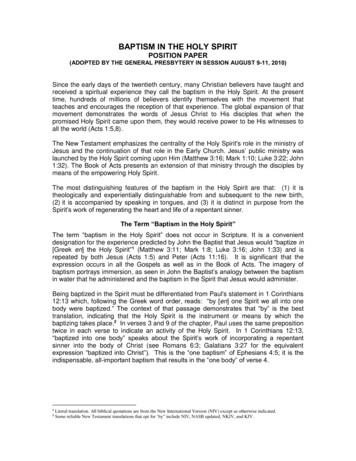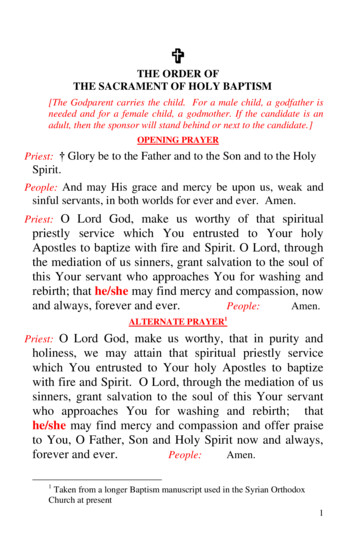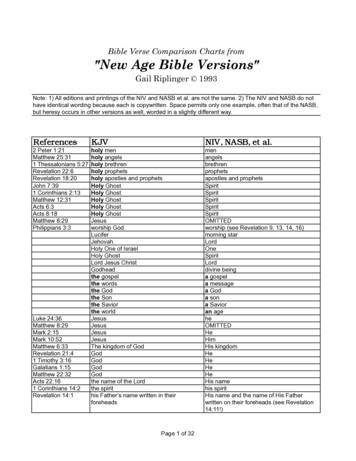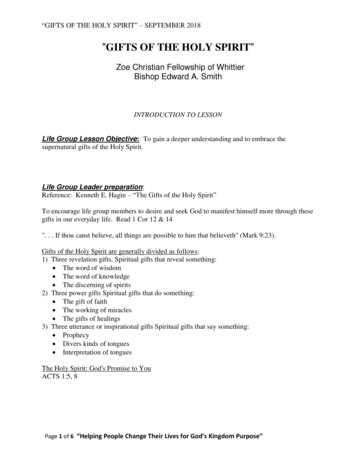
Transcription
BAPTISM IN THE HOLY SPIRITPOSITION PAPER(ADOPTED BY THE GENERAL PRESBYTERY IN SESSION AUGUST 9-11, 2010)Since the early days of the twentieth century, many Christian believers have taught andreceived a spiritual experience they call the baptism in the Holy Spirit. At the presenttime, hundreds of millions of believers identify themselves with the movement thatteaches and encourages the reception of that experience. The global expansion of thatmovement demonstrates the words of Jesus Christ to His disciples that when thepromised Holy Spirit came upon them, they would receive power to be His witnesses toall the world (Acts 1:5,8).The New Testament emphasizes the centrality of the Holy Spirit's role in the ministry ofJesus and the continuation of that role in the Early Church. Jesus’ public ministry waslaunched by the Holy Spirit coming upon Him (Matthew 3:16; Mark 1:10; Luke 3:22; John1:32). The Book of Acts presents an extension of that ministry through the disciples bymeans of the empowering Holy Spirit.The most distinguishing features of the baptism in the Holy Spirit are that: (1) it istheologically and experientially distinguishable from and subsequent to the new birth,(2) it is accompanied by speaking in tongues, and (3) it is distinct in purpose from theSpirit’s work of regenerating the heart and life of a repentant sinner.The Term “Baptism in the Holy Spirit”The term “baptism in the Holy Spirit” does not occur in Scripture. It is a convenientdesignation for the experience predicted by John the Baptist that Jesus would “baptize in[Greek en] the Holy Spirit”1 (Matthew 3:11; Mark 1:8; Luke 3:16; John 1:33) and isrepeated by both Jesus (Acts 1:5) and Peter (Acts 11:16). It is significant that theexpression occurs in all the Gospels as well as in the Book of Acts. The imagery ofbaptism portrays immersion, as seen in John the Baptist’s analogy between the baptismin water that he administered and the baptism in the Spirit that Jesus would administer.Being baptized in the Spirit must be differentiated from Paul's statement in 1 Corinthians12:13 which, following the Greek word order, reads: “by [en] one Spirit we all into onebody were baptized.” The context of that passage demonstrates that “by” is the besttranslation, indicating that the Holy Spirit is the instrument or means by which thebaptizing takes place.2 In verses 3 and 9 of the chapter, Paul uses the same prepositiontwice in each verse to indicate an activity of the Holy Spirit. In 1 Corinthians 12:13,“baptized into one body” speaks about the Spirit’s work of incorporating a repentantsinner into the body of Christ (see Romans 6:3; Galatians 3:27 for the equivalentexpression “baptized into Christ”). This is the “one baptism” of Ephesians 4:5; it is theindispensable, all-important baptism that results in the “one body” of verse 4.12Literal translation. All biblical quotations are from the New International Version (NIV) except as otherwise indicated.Some reliable New Testament translations that opt for ‘by” include NIV, NASB updated, NKJV, and KJV.
To summarize: At conversion, the Spirit baptizes into Christ/the body of Christ; in asubsequent and distinct experience, Christ will baptize in the Holy Spirit.Other Biblical Terms for Spirit BaptismVarious biblical terms are used for this experience, especially in the Book of Acts, whichrecords the initial descent of the Spirit upon Jesus’ disciples and gives examples of theSpirit’s similar encounters with God’s people. The following expressions in Acts areused interchangeably for the experience: baptized in the Spirit—1:5; 11:16; see also Matthew 3:11; Mark 1:8;Luke 3:16; John 1:33. The term “Spirit baptism” often serves as auseful substitute and is employed in this paper.the Spirit coming, or falling, upon—1:8; 8:16; 10:44; 11:15; 19:6; seealso Luke 1:35; 3:22the Spirit poured out—2:17,18; 10:45the gift my Father promised—1:4the gift of the Spirit—2:38; 10:45; 11:17the gift of God—8:20; 11:17; 15:8receiving the Spirit—8:15,17,19; 19:2filled with the Spirit—2:4; 9:17; also Luke 1:15,41,67. This expression,along with “full of the Spirit,” has a wider application in Luke’s writings.Paul’s command to be “filled with the Spirit” (Ephesians 5:18) doesnot refer to the initial fullness of the Spirit; it is an injunction to keep onbeing filled with the Spirit.3Not one of these terms fully conveys all that the experience involves. They aremetaphors conveying the idea that the recipients are thoroughly dominated oroverwhelmed by the Spirit, who already dwells in them (Romans 8:9,14–16;1 Corinthians 6:19; Galatians 4:6).SUBSEQUENCE AND SEPARABILITYOld Testament BackgroundThe outpouring of the Spirit on the Day of Pentecost (Acts 2) was the climax of God’spromises, made centuries before, about the institution of the new covenant and thecoming of the age of the Spirit. The Old Testament is indispensable for understandingthe coming of the Holy Spirit to believers under the new covenant. Two propheticpassages are especially significant—Ezekiel 36:25–27 and Joel 2:28,29:I will sprinkle clean water on you, and you will be clean; I will cleanse youfrom all your impurities and from all your idols. I will give you a new heartand put a new spirit in you; I will remove from you your heart of stone andgive you a heart of flesh. And I will put my Spirit in you and move you tofollow my decrees and be careful to keep my laws (Ezekiel 36:25-27).And afterward, I will pour out my Spirit on all people. Your sons anddaughters will prophesy, your old men will dream dreams, your youngmen will see visions. Even on my servants, both men and women, I willpour out my Spirit in those days (Joel 2:28–29).3The verb is in the Greek present tense, which conveys the meaning of a continuing or ongoing action.
The Ezekiel passage speaks about cleansing new believers from all spiritual filthinessand replacing their heart of stone with a “new heart” and a “heart of flesh.” This takesplace as a result of the indwelling Holy Spirit, who will enable them to live in obedienceto God's decrees and laws. The promise predicts the New Testament teaching aboutregeneration. Jesus spoke of the need to be “born of the Spirit” (John 3:5,8) and Paul,echoing Ezekiel's prophecy, says that God “saved us through the washing of rebirth andrenewal by the Holy Spirit” (Titus 3:5). The result is an altered lifestyle made possible bythe indwelling Spirit.Joel’s prophecy differs substantially from Ezekiel’s. It speaks of a dramatic pouring out ofthe Spirit that results in prophesying, dreams, and visions. The term charismatic in ourday has come to identify those who believe in and experience, personally andcorporately, the dynamic way the Spirit manifests himself through various gifts, such asthose enumerated in 1 Corinthians 12:7–10.4 On the Day of Pentecost, the discipleswere “filled with the Holy Spirit,” which Peter says was in fulfillment of Joel’s prophecy(Acts 2:16–21).The prophecies of Ezekiel and Joel, however, do not predict two separate, historiccomings of the Holy Spirit. They represent two aspects of the one overall promise thatincludes both the Spirit’s indwelling and His filling or empowering of God’s people.Importance of Luke’s WritingsLuke’s writings—the third Gospel and the Book of Acts—provide the clearestunderstanding of the baptism in the Spirit. Luke, in addition to being an accuratehistorian, is also a theologian in his own right and uses the medium of historical narrativeto convey theological truth.5Apart from the four Gospels, the only undisputed references to John the Baptist’sprediction of Spirit baptism are in the Book of Acts (1:5; 11:16). In addition, Luke’s is theonly Gospel that has two sayings of Jesus that relate directly to Spirit baptism: “If youthen, though you are evil, know how to give good gifts to your children, how much morewill your Father in heaven give the Holy Spirit to those who ask Him?” (11:13); “I amgoing to send you what my Father has promised; but stay in the city until you have beenclothed with power from on high” (24:49).The opening chapter of Acts picks up the theme of these promises. Jesus told Hisdisciples: “Do not leave Jerusalem, but wait for the gift my Father promised, which youhave heard me speak about. For John baptized with [en] water, but in a few days youwill be baptized with [en] the Holy Spirit” (Acts 1:4,5); “But you will receive power whenthe Holy Spirit comes on you; and you will be my witnesses in Jerusalem, and in allJudea and Samaria, and to the ends of the earth” (Acts 1:8). The entire Book of Acts is acommentary on these verses, elaborating on the two related themes of spiritualempowerment and the spread of the gospel throughout the Roman Empire. It istherefore necessary to explore what Luke says about Spirit baptism.45The Greek word charisma, however, has a wider range of meanings in the NT. Its basic meaning is that it is a gracious gift.See I. Howard Marshall's, Luke: Historian and Theologian. Grand Rapids: Zondervan, 1970.
This emphasis in Luke’s writings, however, does not minimize other important aspects ofthe Holy Spirit’s ministry in non-Lukan writings as, for example, in John 14–16; Romans8; 1 Corinthians 12–14. Nor does it imply that all non-Lukan writers are silent on thematter of Spirit baptism or that Luke limits the Spirit’s activity only to Spirit baptism.It is important to recognize that Luke wrote under the inspiration of the Holy Spirit. SinceLuke-Acts is historical in nature, Luke selected incidents and sayings that emphasize thedynamic aspect of the Spirit’s work.The first four chapters of Luke’s Gospel present a clear picture that the promised age ofthe Spirit was being inaugurated. Luke portrays the activity of the Holy Spirit in a mannerclearly reminiscent of the prophecy of Joel. For four hundred years the activity of theSpirit among God’s people had been virtually absent. It now bursts forth in a successionof events related to the births of both John the Baptist and Jesus, and to the beginning ofJesus’ earthly ministry. Angelic visitations, miraculous conceptions, prophetic utterances,the Spirit’s descent upon Jesus at His baptism, the empowerment of Jesus for Hisearthly ministry—these are all recorded in rapid succession in order to emphasize thedawn of the promised age.Methodology FollowedNarrative accounts recorded in Acts in which believers experience an initial filling of theSpirit have a direct bearing on the questions of whether Spirit baptism is separate fromregeneration and whether speaking in tongues is a necessary component of theexperience. The inductive method will be employed in looking at these incidents; it is avalid form of logic that attempts to form a conclusion based on the study of individualincidents or statements.6“Subsequence” in ActsThe Day of Pentecost (Acts 2:1–21). The first instance of disciples receiving acharismatic-type of experience occurred on the Day of Pentecost (Acts 2:1–4). Thecoming of the Spirit on that day was unprecedented; it was a unique, historic, once-forall and unrepeatable event connected with the institution of the new covenant. But asActs indicates, at a personal level the disciples’ experience at Pentecost serves as aparadigm for later believers as well (8:14–20; 9:17; 10:44–48; 19:1–7).Was the Pentecost experience of the disciples “subsequent” to their conversion? On oneoccasion Jesus told seventy-two of His disciples to “rejoice that your names are writtenin heaven” (Luke 10:20). It is not necessary to pinpoint the precise moment of theirregeneration in the New Testament sense of that word. Had they died prior to thedescent of the Spirit at Pentecost, they surely would have gone into the presence of theLord. Many scholars, however, see the disciples’ new-birth experience occurring at thetime the resurrected Jesus “breathed on them and said, ‘Receive the Holy Spirit’ ” (John20:22).It is significant that the New Testament nowhere equates the expression “filled with theHoly Spirit” (verse 4) with regeneration. It is always used in connection with persons whoare already believers.6The formulated doctrine of the Trinity is the result of an inductive study of Scripture, as is the doctrine of the hypostatic union—thatChrist was and is both fully human and fully divine, yet one person.
The Samaritans (8:14–20). The Samaritan “Pentecost” demonstrates that one may be abeliever and yet not have a charismatic-type of spiritual experience. The followingobservations show that the Samaritans were genuine followers of Jesus prior to the visitof Peter and John: (1) Philip clearly proclaimed to them the good news of the gospel(verse 5); (2) they believed and were baptized (verses 12,16); (3) they had “accepted[dechomai] the word of God” (verse 14), an expression synonymous with conversion(Acts 11:1; 17:11; see also 2:41); (4) the laying on of hands by Peter and John was forthem to “receive the Holy Spirit” (verse 17), a practice the New Testament neverassociates with receiving salvation; and (5) the Samaritans, subsequent to theirconversion, had an observable and dramatic experience of the Spirit (verse 18).Saul of Tarsus (Acts 9:17). The experience of Saul of Tarsus also demonstrates thatbeing filled with the Holy Spirit is an identifiable experience beyond the Spirit’s work inregeneration. Three days after his encounter with Jesus on the Damascus Road (Acts9:1–19), he was visited by Ananias. The following observations are important:(1) Ananias addressed him as “Brother Saul,” which probably indicates a mutuallyfraternal relationship to the Lord Jesus Christ; (2) Ananias did not call on Saul to repentand believe, though he did encourage him to be baptized (Acts 22:16); (3) Ananias laidhis hands on Saul for both healing and being filled with the Spirit; and (4) There was atime span of three days between Saul’s conversion and his being filled with the Spirit.Household of Cornelius at Caesarea (Acts 10:44–48). The narrative about Corneliusreaches its climax with the outpouring of the Holy Spirit upon him and his household. Hewas not a Christian prior to Peter’s visit; he was a God-fearer—a Gentile who hadforsaken paganism and embraced important aspects of Judaism without becoming aproselyte, that is, a full-fledged Jew. Apparently Cornelius’s household believed andwere regenerated at the moment Peter spoke of Jesus as the one through whom“everyone who believes in him receives forgiveness of sins through his name” (verse43). Simultaneously, it seems, they experienced an outpouring of the Spirit like the oneon the Day of Pentecost, as Peter later told the leadership of the church in Jerusalem(11:17; 15:8,9). The expressions used to describe that experience do not occurelsewhere in Acts to describe conversion: “the Holy Spirit fell upon” (10:44; cf. 8:16[both references NASB Updated]); “the gift of the Holy Spirit” (10:45; 11:17; cf. 8:20);“poured out on” (10:45); “baptized with [en] the Holy Spirit” (11:16).The Spirit baptism of the new believers in Caesarea parallels that of believers inJerusalem (Acts 2), Samaria (Acts 8), and Damascus (Acts 9). But unlike the experienceof their predecessors, they had a unified experience whereby their conversion and theirbaptism in the Spirit occurred in rapid succession.The Disciples in Ephesus (Acts 19:1–7). At Ephesus, Paul encountered a group ofdisciples who had not experienced the baptism in the Spirit. This incident raises threeimportant questions:(1) Were these men disciples of Jesus or disciples of John the Baptist?Throughout the Book of Acts, every other occurrence of the word “disciple” (mathētēs),with one exception,7 refers to a follower of Jesus. Luke’s reason for calling these men“some disciples” is that he was not sure of the exact number—“about twelve men in all”7Acts 9:25, where the phrase “his disciples” (NASB Updated) refers to followers of Paul. NIV reads “his followers.”
(verse 7). They were Christian believers in need of teaching; like Apollos (Acts 18:24–27), they needed to have “the way of God” explained “more adequately” (18:26).(2) What did Paul mean by the question, “Did you receive the Holy Spirit, havingbelieved?” (a strict translation of verse 2).8 He sensed among them a spiritual lack, butdid not question the validity of their belief in Jesus. Since in the Book of Acts the clause“to receive the Holy Spirit” refers to Spirit baptism9 (8:15,17,19; 10:47; see also 2:38),Paul is asking if they have had the experience of the Holy Spirit coming upon them in acharismatic way, as did indeed happen to them subsequently (verse 6).(3) Does Paul agree with Luke that there is a work of the Spirit for believers thatis distinguishable from the Spirit’s work in salvation? This incident at Ephesus, as well asPaul’s own experience (Acts 9:17), requires an affirmative answer.Summary Statements1. In three of the five instances—Samaria, Damascus, Ephesus—persons who had anidentifiable experience of the Spirit were already believers. At Caesarea, that experiencewas almost simultaneous with the saving faith of Cornelius and his household. InJerusalem, the recipients were already believers in Christ even though it may bedifficult—if it is even necessary—to determine with certainly the point in time when theywere regenerated in the New Testament sense.2. In three accounts there was a time-lapse between conversion and Spirit baptism(Samaria, Damascus, Ephesus). The waiting interval for the Jerusalem outpouring wasnecessary in order for the typological significance of the Day of Pentecost to be fulfilled.In the case of Caesarea, there was no distinguishable time lapse.3. A variety of interchangeable terminology is used for the experience of Spirit baptism.4. Groups (Jerusalem, Samaria, Caesarea, Ephesus) as well as an individual (Paul)received the experience.5. The imposition of hands is mentioned in three instances (Samaria, Damascus,Ephesus) but it is not a requirement, as evidenced by the outpourings in Jerusalem andCaesarea.6. Even though Spirit baptism is a gift of God's grace, it should not be called “a secondwork of grace” or “a second blessing.” Such language implies that a believer can haveno experience or experiences of divine grace between conversion and Spirit baptism.7. The ideal and biblically correct view is that a time-gap between regeneration andSpirit baptism is not a requirement. The emphasis should be on theological, nottemporal, subsequence and separability.For “having believed [pisteusantes],” Greek grammar allows for a translation either of “when you believed” (coincident time) or“after you believed” (antecedent time). Context favors the latter.9In John’s Gospel, of course, the resurrected Jesus did address the disciples with the imperative, “Receive the Holy Spirit” (20:22).Biblical scholars understand John’s usage variously, some seeing it as the immediately realized gift of the Spirit in regeneration,others as anticipation of the Pentecost event, and still others as an independent Johannine report of Pentecost.8
SPEAKING IN TONGUESSpirit-Inspired Utterances Prior to Acts 2In the Old Testament, the Holy Spirit manifested himself in a variety of ways, but Hismost characteristic and most frequent work and ministry was that of giving inspiredutterance. In addition to prophetic writings, there were many instances when peopleprophesied orally at the Spirit’s prompting—for example, Numbers 11:25–26; 24:2,3;1 Samuel 10:6,10; 19:20–21. This inspiration to prophesy is the link that connects OldTestament oracular utterances with Joel’s prediction that one day all God’s people wouldprophesy (Joel 2:28,29) and with Moses’ intense desire—he himself being a prophet—that all God’s people might prophesy (Numbers 11:29).A vital connection exists between Old Testament people prophesying and comparableexperiences of New Testament people prior to the Day of Pentecost, especially asrecorded in Luke 1–4. In those chapters Luke records that certain people were filled withthe Spirit—John the Baptist, his mother Elizabeth, and his father Zechariah—and alsothat a number of people prophesied under the influence of the Holy Spirit—Elizabeth,Zechariah, Mary, and Simeon. In addition, mention is made of Anna, a prophetess(2:36).Evidential Tongues in ActsThe Day of Pentecost (2:1–21). Three dramatic phenomena occurred: a violent wind,fire, and speaking in tongues.10 The wind and the fire, which in Scripture are symbols ofthe Holy Spirit, preceded the outpouring of the Spirit; but the phenomenon of speaking intongues was an integral part of the disciples’ experience of Spirit baptism. The impetusfor speaking in tongues was the Holy Spirit. The Greek verb apophthengomai at the endof verse 4 occurs again in verse 14 to introduce Peter’s speech to the crowd. It is anunusual and infrequently used word, and may be translated “to give inspired utterance.”The Greek verb phrase for speaking in tongues (lalein glōssais) does not appear innonbiblical literature as a technical term for speaking a language one does not know. Butit is used by both Luke (Acts 2:4; 10:46; 19:6) and Paul (1 Corinthians 12:30; 13:1;14:5,6,18,23,39) with that meaning.The Greek word glōssa means the tongue as the organ of speech and, by extension, theproduct of speech—language. In Acts 2, the languages spoken by the disciples wereunknown to them but were understood by others. They were human, identifiablelanguages. Luke says that the disciples spoke in other tongues—that is, languages nottheir own. However, in the other occurrences in Acts where speaking in tongues ismentioned (10:46; 19:6), there is no indication the languages were understood oridentified. Paul’s writings imply that Spirit-inspired languages may not always be human,but may be spiritual, heavenly, or angelic (1 Corinthians 13:1; 14:2,14) as a means ofcommunication between a believer and God.The English technical term for speaking in tongues is “glossolalia,” from the Greek words glōssa (tongue, language) and lalia(speech). The word does not occur in Scripture.10
Two very important observations are in order:(1) On the Day of Pentecost, all who were filled with the Spirit spoke in tongues(Acts 2:4).(2) Peter, in explaining to the crowd the meaning of the disciples’ experience,said it was in fulfillment of Joel 2:28,29 (Acts 2:16–21). Especially significant is thatPeter, in the middle of quoting Joel, inserted the words “and they will prophesy” (verse18c), stressing prophetic utterance as a key feature of the fulfillment. But is speaking intongues the same as prophesying? Both oral prophesying and speaking in tonguesoccur when the Holy Spirit comes upon someone and prompts the person to speak. Thebasic difference is that prophesying is in the speaker’s own language, whereas speakingin tongues is in a language unknown to the speaker. But the mode of operation for thetwo gifts is the same. Speaking in tongues may therefore be considered a specialized orvariant form of prophesying as to the manner in which it functions.The Samaritans (8:14–20). The Samaritans had witnessed signs performed by Philip,had responded in faith to the message about Christ, and had submitted to baptism. Butthey had not yet received the Holy Spirit (verse 15). “Peter and John placed their handson them, and they received the Holy Spirit” (verse 17). Simon the sorcerer foundsomething so extraordinary in this gift of the Spirit that he immediately wanted theauthority to impart the gift himself. He had already witnessed demon expulsions andhealings, but this was markedly different. Luke simply says that Simon “saw” orwitnessed that the Spirit was given; something observable took place. The consensusamong biblical scholars, many of whom are not Pentecostal or charismatic, is that theSamaritans had a glossolalic experience.This account falls between the two major narratives in chapters 2 and 10 thatunambiguously associate glossolalia with Spirit baptism. Therefore this incident mayrightly be called “The Samaritan Pentecost.”Saul of Tarsus (9:17). Luke does not record any details of Paul’s Spirit baptism. We doknow, however, that Paul spoke in tongues regularly and often (1 Corinthians 14:18). Itseems legitimate and logical to infer that he first spoke in tongues at the time Ananiaslaid hands on him. As with the Samaria account, this narrative comes between the twoincidents that clearly say all spoke in tongues when they were baptized in the Spirit.The Household of Cornelius at Caesarea (Acts 10:44–48). Several observations areimportant:(1) Peter clearly identified the experience of Cornelius’s household with that ofthe Pentecost disciples: “God gave them the same gift as he gave us” (Acts 11:17; seealso 15:8). In addition, common terms like “baptized with [en] the Holy Spirit,” “pouredout,” and “gift” appear in both accounts.(2) The outward, observable manifestation of glossolalia convinced Peter’sJewish-Christian companions that the Spirit had indeed fallen on these Gentiles: “Forthey heard them speaking in tongues and praising God” (verse 46, italics added foremphasis).
(3) Very likely, the phrase “praising [megalunō]11 God” is a commentary on thecontent of the glossolalia. Acts 2:11 is relevant, which identifies the content of theglossolalia on Pentecost as a recital of “the wonders [megaleia] of God.”(4) All the recipients spoke in tongues (verse 44). This incident and the Pentecostincident which also says that all spoke in tongues indisputably and unambiguouslyconnect glossolalia with the baptism in the Spirit. The two narratives bracket the two inchapters 8 and 9 where Luke did not give details about the believers’ Spirit experience.The Disciples in Ephesus (Acts 19:1–7). When the Holy Spirit came upon thesedisciples, “they spoke in tongues and prophesied” (verse 6). The Greek text may betranslated: “Not only [te] did they speak in tongues, but they also [kai ] prophesied.”12Summary Statements1. Throughout the Old Testament, the early chapters of Luke’s Gospel and the Book ofActs, there is a pattern of inspired speech when the Holy Spirit comes upon people.2. The outpouring of the Spirit on the Day of Pentecost is the model, or paradigm, forlater outpourings.3. Speaking in tongues, as to the manner in which it occurs, may be regarded as aspecialized or variant form of prophecy.4. Speaking in tongues was an integral part of Spirit baptism in the Book of Acts. It isthe only manifestation associated with Spirit baptism which is explicitly presented asevidence authenticating the experience, and on that basis should be considerednormative.5. The Pentecostal doctrine of “the initial, physical evidence” of speaking in tongues isan attempt to encapsulate the thought that at the time of Spirit baptism the believer willspeak in tongues. It conveys the idea that speaking in tongues is the initial, empiricalaccompaniment to Spirit baptism. Nowhere does the Scripture indicate that one may bebaptized in the Spirit without speaking in tongues.6. First Corinthians 12:30 is sometimes elicited as evidence that tongues are not anecessary component of Spirit baptism since Paul asks, “Not all speak in tongues, dothey?”13 But both the broad context and the immediate context relate the question to theexercise of the gift in corporate worship, as noted by the question immediately following:“Not all interpret, do they?” According to 1 Corinthians 12:8–10, only some believers areprompted by the Holy Spirit to give an utterance in tongues in a gathering of God'speople.11See Luke 1:46 and Acts 19:17 for parallel occurrences.The Greek construction is te . . . kai which, along with te kai, is common in the Book of Acts. The following are possibletranslations: “as . . . so; not only . . . but also.” Some grammatical examples are in Acts 1:1,8; 4:27; 8:12; 9:2; 22:4; 26:3. A GreekEnglish Lexicon of the New Testament and Other Early Christian Literature (3rd ed.). Revised and edited by Frederick WilliamDanker. Chicago: The University of Chicago Press, 2000, p. 993.13A strict translation, based on the Greek form of the seven questions in this verse.12
PRACTICAL ASPECTS OF SPIRIT BAPTISMContinuing Evidences of Spirit BaptismDivinely-intended results of Spirit baptism include:Speaking in Tongues. Speaking in tongues is the initial, empirical indication that theinfilling has taken place but it also benefits the speaker spiritually, for Paul says that“anyone who speaks in a tongue does not speak to men but to God” and that “he whospeaks in a tongue edifies himself” (1 Corinthians 14:2,4). This is the devotional aspectof tongues, which is associated with praising God and giving Him thanks (verses16,17).This aspect is sometimes called a prayer language. It is an element in praying in theSpirit (Ephesians 6:18; Jude 20). Because it is a means by which believers edifythemselves spiritually, tongues may be called a means of grace. It is not an experiencethat occurs only at the time of being baptized in the Spirit; it ought to be a continual,repeated experience. This is implied in Paul’s statement to the Corinthians: “I wish all ofyou to continue speaking in tongues” (1 Corinthians 14:5, a strict translation reflectingthe Greek verb tense).In addition, some qualified exegetes understand Paul to mean praying in tongues, or atleast to include it, when he says that “the Spirit helps us in our weakness. We do notknow what we ought to pray for, but the Spirit himself intercedes for us with groans thatwords cannot express” (Romans 8:26).Openness to Spiritual Manifestations. Spirit baptism opens up the receiver to the fullrange of spiritual gifts. This is a natural consequence of having already submitted tosomething supernatural and suprarational by allowing oneself to be overwhelmed by theSpirit. But this does not rule out spiritual gifts among those not Spirit filled. Both the OldTestament and the Gospels show that most of the gifts occurred prior to the Day ofPentecost, yet it was not until after the outpouring of the Spiri
all the world (Acts 1:5,8). . The Book of Acts presents an extension of that ministry through the disciples by means of the empowering Holy Spirit. The most distinguishing features of the baptism in the Holy Spirit are that: (1) it is . prediction of Spirit baptism are in the Book of Acts (1:5; 11:16). In addition, Luke's is the .










